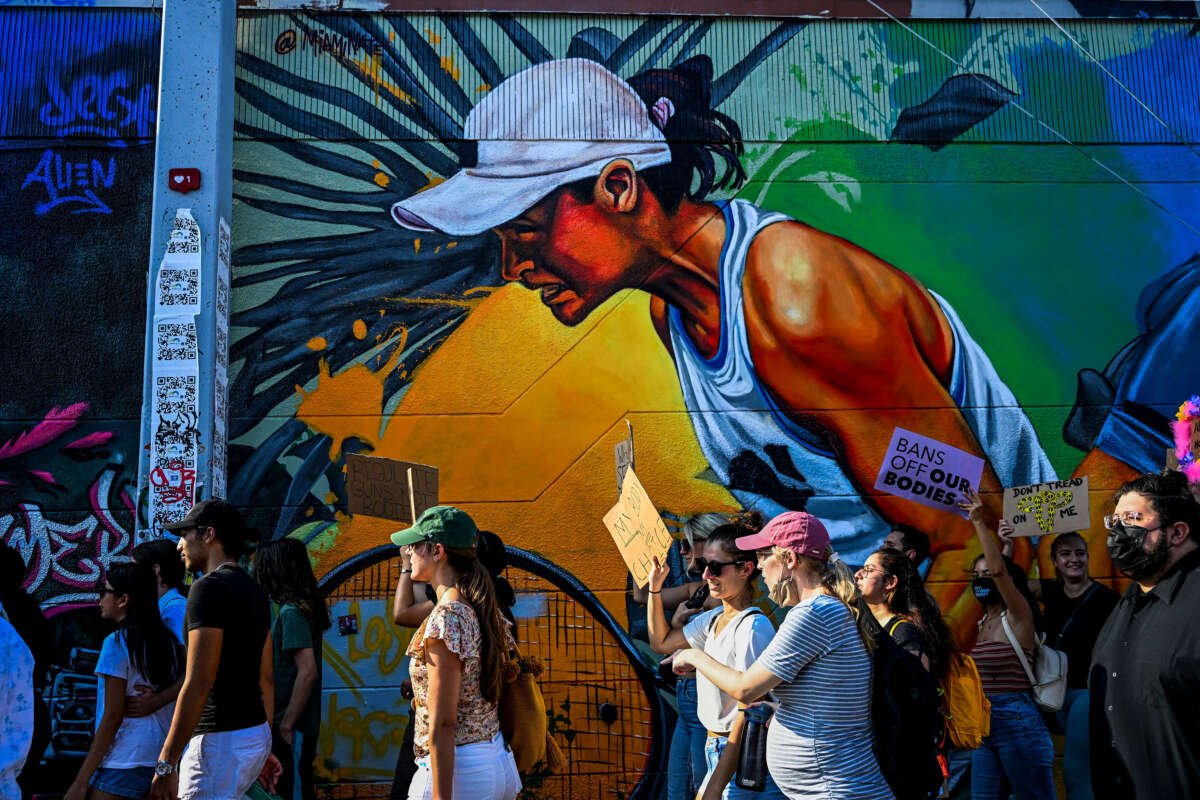Honest, paywall-free news is rare. Please support our boldly independent journalism with a donation of any size.
The Florida Supreme Court released two opinions on Monday that will affect abortion access in the state, including one in which a ballot initiative on reproductive rights will move forward for voters to decide on this fall.
Between then and now, however, abortion access will be severely limited within the state.
In a 6-1 decision, the state’s highest court overturned decades of previously established precedent regarding abortion rights in the state. For years, a privacy protection clause in the Florida constitution had been interpreted as protecting a right to abortion. After a six-week ban on abortion passed the state legislature and was signed into law by Republican Gov. Ron DeSantis, abortion rights groups challenged it on the basis that it violated those previously held precedents.
The State Supreme Court disagreed in its ruling, stating that there was “no clear right to abortion embodied within the Privacy Clause” of the constitution — contradicting years of stare decisis decisions that have ruled otherwise. The six-week ban will be implemented starting in May.
Abortion rights proponents blasted the ruling as woefully flawed.
“The new law, the six-week ban, in some few weeks, that is going to be a potential life and death matter for a lot of women,” said Cecile Scoon, co-president of the League of Women Voters of Florida.
“This is absolutely catastrophic for Florida and for the entire Southeast. In 30 days, Florida will implement a near-total abortion ban,” said Hayley McMahon, a public health scientist who studies abortion at Emory RISE.
In a separate ruling, however, the State Supreme Court gave abortion rights proponents some hope that the six-week ban could be overturned through a ballot initiative. In a 4-3 decision, the court said that a challenge from the state attorney general’s office against the ballot initiative wasn’t strong enough to prevent it from moving forward. The initiative will appear on the November ballot, the court ruled.
State Attorney General Ashley Moody had alleged that the wording of the proposed constitutional amendment was too confusing for voters, as it would allow abortion access in the state up to fetal “viability” — a time frame generally viewed to be around 22-25 weeks of pregnancy. But Floridians already lived under such precedent, as viability protections have been in place across the entire country for nearly half a century under standards established in the federal Supreme Court case Roe v. Wade, which was upended by a far right conservative iteration of that Court in 2022.
The Florida Supreme Court’s ruling on that matter was celebrated by abortion rights activists.
“We are thrilled that Florida voters will have the chance to make their voices heard on this pressing issue in November,” Center for Reproductive Rights president and CEO Nancy Northup said in a statement.
Polling shows that most Floridians are supportive of abortion rights that extend far beyond the six-week ban that will soon become law in the state, and even beyond the 15-week ban that is currently being enforced. But to become an amendment, the ballot initiative will have to pass with support from a supermajority of voters, requiring a 60 percent threshold to become part of the state’s highest governing document.
The vote is likely to be a very close one — in a University of North Florida poll from November, 62 percent of voters said that they would vote “yes” on the measure, indicating a high likelihood that it can pass. However, the margin of error for that poll was around 4.37 points, meaning that it’s possible fewer than 60 percent of voters in the state would actually back the measure. Conversely, it could also mean that greater than 66 percent of the people support it, too.
Press freedom is under attack
As Trump cracks down on political speech, independent media is increasingly necessary.
Truthout produces reporting you won’t see in the mainstream: journalism from the frontlines of global conflict, interviews with grassroots movement leaders, high-quality legal analysis and more.
Our work is possible thanks to reader support. Help Truthout catalyze change and social justice — make a tax-deductible monthly or one-time donation today.
